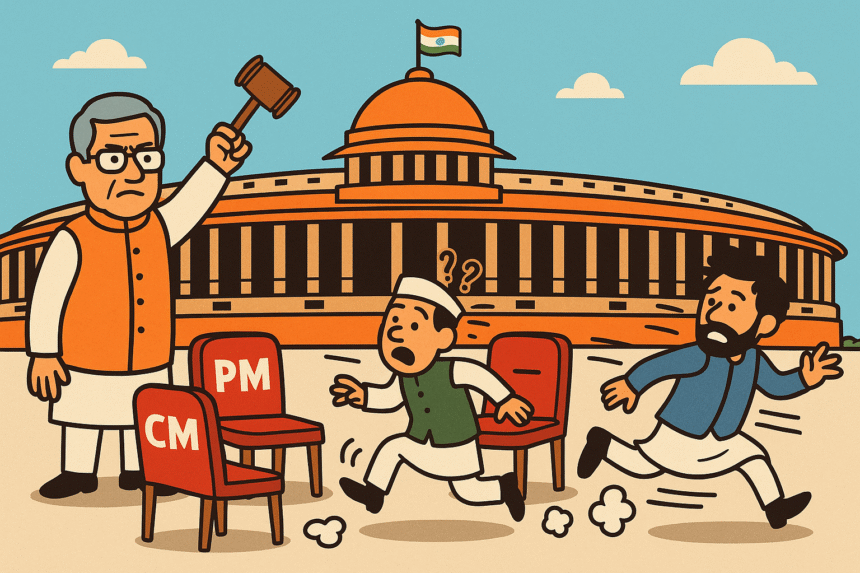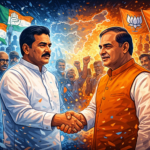Three new bills propose removing the PM, CMs, or ministers if held in custody for 30 days on serious charges. Here’s a witty breakdown with facts and satire.
When Politics Becomes Musical Chairs
Imagine playing musical chairs—except when the music stops, anyone in custody for 30 days loses a seat. That’s exactly what Parliament looked like this week, minus the dance music.
Union Home Minister Amit Shah tabled three big bills in Lok Sabha. They say: if the PM, a CM, or any minister is in custody for 30 days for crimes punishable with five years or more, they must vacate their office by Day 31. No waiting for conviction. No “innocent until proven guilty” shield.
The moment they step out of jail, they can fight for their seat back. But until then—thank you, next.
What Are These Bills?
The package included:
- The Constitution (130th Amendment) Bill, 2025
- Government of Union Territories (Amendment) Bill, 2025
- Jammu and Kashmir Reorganisation (Amendment) Bill, 2025
Together, these bills aim to change Articles 75, 164, and 239AA. In short, they create a rulebook: high offices are vacated automatically if the person is jailed for 30 days under serious charges.
Basically, Parliament is introducing a “VIP Exit Only” sign in the Constitution.
Why the Fireworks in Parliament?
Because Indian politics without drama is like chai without masala—bland and impossible.
The opposition saw red. MPs stormed into the well, tore copies of the bills, and shouted slogans. Some called it “Emergency 2.0,” others claimed it was a “Constitutional coup.”
Their biggest gripe? The principle of “innocent until proven guilty.” If a CM is jailed for 30 days—even on flimsy charges—they lose their post, even before a judge has spoken.
Imagine a rival government using this as a political weapon: “Jail the CM, remove the CM, rule the state.”
What the Government Says
Amit Shah and supporters defended the move:
- Morality First – Leaders facing serious charges shouldn’t sit in high office.
- Clean Politics – This aligns with what happens to civil servants, who lose posts when arrested.
- Public Trust – The law strengthens democracy by making leaders accountable.
In short, the government says: “No one is bigger than the Constitution. Not even a PM or CM.”
What the Opposition Fears
- Misuse of Power – Arrest a leader for 30 days and boom—political vacuum created.
- Threat to Federalism – States fear central overreach through these provisions.
- Democratic Deficit – Critics argue this weakens voters’ choices.
Leaders like Priyanka Gandhi called it “draconian,” while Mamata Banerjee warned it was “Hitler in disguise.” Their message: this is not about clean politics, but silencing opponents.
Sent to the JPC
Given the uproar, the bills were sent to a Joint Parliamentary Committee (JPC). It has members from both Houses, including opposition voices. The JPC will study the bills and return recommendations, likely in the next session.
Think of the JPC as a political cooling-off zone, where hot tempers are supposed to calm and serious review happens. Though, knowing politics, expect more sparks than peace.
Breaking It Down Simply
| Point | What It Means | Satirical Take |
|---|---|---|
| 30 days custody | Automatic removal from post | “Jail = Jobless” rule for VIPs |
| Applies to PM, CMs, Ministers | High offices not immune | No more “Sorry, I was in Tihar but still CM” excuses |
| Reinstatement possible | Once released, can reclaim | Like a Netflix subscription—pause and resume |
| Applies to Union Territories & J&K too | Wider net | Nobody escapes the new attendance register |
Why It Matters
- Accountability vs Misuse – Will this curb corruption or fuel vendetta politics?
- Balance of Power – How much say does Delhi have over states?
- Future Politics – Could this rewrite how leaders behave—or how rivals attack?
India has often struggled with tainted leaders continuing in office despite charges. This bill could end that. Or, it could become a powerful political hammer.
Humor in Reality
- Exam 2030 Question: “Who was India’s PM in July 2025?”
Answer: “Depends—was he in custody or not?” - WhatsApp forward: “30 din mein CM free nahi, kursi free.”
- Voters in a state: “So we voted for a CM… but got an acting CM instead.”
Nokjhok Verdict
At its core, the bills bring a sharp message: no leader is untouchable. But in politics, laws are only as good as their use.
This could be a bold move to clean up governance—or a dangerous shortcut to topple rivals.
Accountability is vital, but fairness is non-negotiable. A healthy democracy needs both.
Call to Action
So, do you think this is a masterstroke for clean politics, or a political time bomb waiting to explode? Comment below, and share this with that one friend who keeps saying “Ab toh neta bhi probation pe hain.”
👉 Related Nokjhok Article: “Kartavya Bhavan: Where India’s Future Governance Takes Shape”













